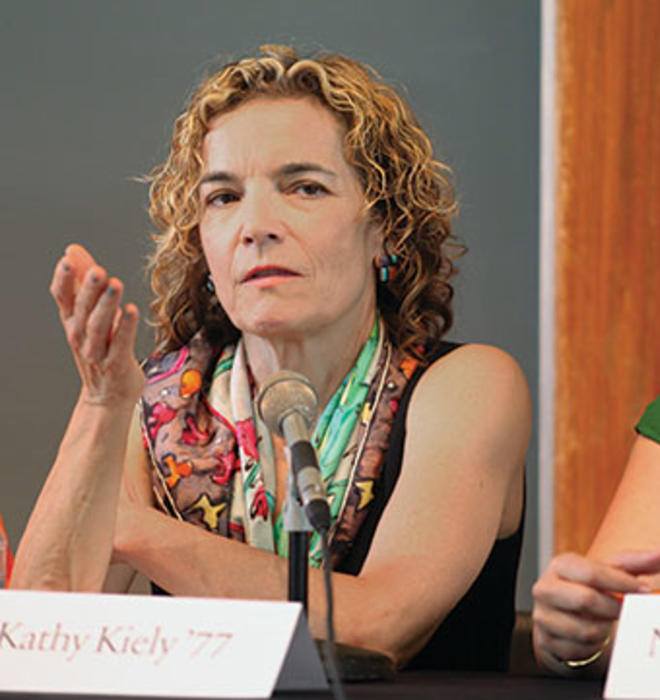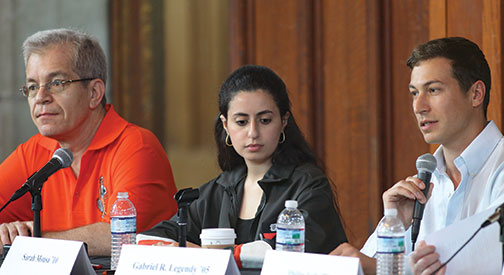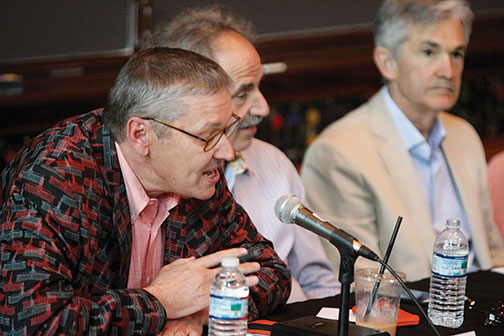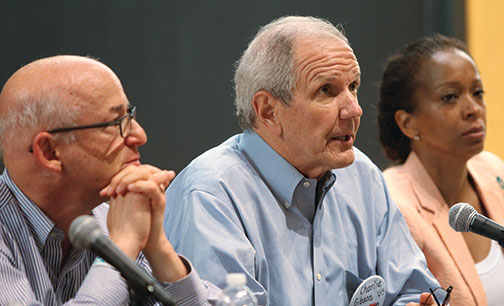
Reunions Panels
Ready, Set, Go!
Alumni journalists and journalism professors provided a glimpse into the next 16 months of presidential campaigning in a lively discussion that touched on everything from video games favored by Ted Cruz ’92, to Hillary Clinton’s reluctance to speak to reporters, to the public’s reliance on social media for news.
The panel, “Presidential Politics: The Road to 2016,” was sponsored by PAW and Princeton’s Ferris Journalism Seminars. Participants were CBS Newscorrespondent Nancy Cordes *99, Washington Post senior editor Marc Fisher ’80,National Journal editor Richard Just ’01, Bloomberg Politics news director Kathy Kiely ’77, People magazine Washington bureau chief Sandra Sobieraj Westfall ’89, Politico deputy editor Marilyn Thompson, and Washington Post reporter Joe Stephens, the Ferris professor in residence.
When an audience member asked if the panel thought the “mini-scandals” surrounding Clinton would affect her chances, Just quickly responded: “We’ve been asking exactly that question about the Clintons since 1992.”
Panelists agreed that in today’s post-recession, social-media-focused environment, there is little interest in the kind of hard-hitting, investigative journalism that was once a staple of coverage of presidential elections. “There is a new issue with ‘click-bait’ journalism, in which you get more [Web] traffic if it’s sensational,” said Washington Post reporter Joel Achenbach ’82, the moderator. “So you have to be a savvy consumer of news and figure out ‘who can I trust here?’”
Who’s going to win in 2016? None of the panelists would guess, though Cordes suggested that the apparent leader so early in a race often falters by the end. “America loves underdogs,” she said.
At least one thing hasn’t changed over the years, Stephens said: the reporter’s role in covering politics. “Reporters aren’t there to ask the hard questions,” he said. “They’re there to get the hard answers.” By Allie Wenner
Mideast Division
The panel brought out emotional expressions of concern about drones, anti-Semitism, and the tragedies faced by residents of the region. It began routinely enough: Jonathan Cohen ’85, deputy chief of mission at the U.S. embassy in Baghdad, explained how the body politic has been enfeebled by high population growth, unemployment, and a refugee crisis, while being ravaged by sectarian conflict. Philip Seib ’70, vice dean at the University of Southern California, noted that China has become the top U.S. foreign-policy priority, and “among the American people there is a case of Arab fatigue — a case of ‘let them clean up their own mess, for a change.’”
Two younger speakers — Gabriel Legendy ’05 and Sarah Mousa ’10 — spoke about their personal experiences in the region: Legendy as a captain in the Special Forces in Afghanistan, and Mousa as an activist and journalist in Cairo.
Then Robert Silverman ’80, a Foreign Service officer with extensive Mideast experience, took aim at a local issue: the faculty petition calling for divestment from companies that “contribute to or profit from” Israel’s occupation of the West Bank. “Divestment from Israel is an anti-Semitic act. I’m very concerned about that,” he said to applause, reminding the audience of incidents of discrimination against Jews in Princeton’s past.
Mousa responded at the end of the session. “It’s a little unfair to boil it down to anti-Semitism,” she said. “This is about specific policies that have tangible impacts on people in the region.” More applause.
With that, the panel ended, the moderator suggesting that the contentious discussion seemed appropriate. By Marilyn H. Marks *86
Wealth Gap
“Equality of opportunity” may be a comforting buzzword for the rich, but opportunities are few and far between for those on the losing end of America’s widening income gap, alumni said at a Friday panel on “Wealth Imbalance — What Does it Mean?” It’s “the American dream of mobility that is being threatened more than anything else,” said Edward Golding *82, principal deputy assistant secretary for the U.S. Office of Housing.
Asked by an audience member how presidential candidates should think about solving that problem, Harvard professor Gregory Mankiw ’80, chairman of the Council of Economic Advisers to President George W. Bush, offered a swift response: “It boils down to education.”
Others pointed to housing policy and suburbanization as key culprits, and the discussion turned repeatedly to the impoverished neighborhood in West Baltimore that became the site of rioting over the death of Freddie Gray, an African American man who died while in police custody. Moderator and sociology professor Patricia Fernandez-Kelly was quick to point out that income inequality is linked to “the elephant in the room, which is race and class.”
We might like to believe that “a rising tide lifts all boats,” but we too often forget that “not everyone has a boat,” said Federal Reserve Governor Jerome Powell ’75. “Since the 1970s, not every boat has been lifted in a meaningful way. ... That is the issue of stagnant incomes in America.” By Katharine S. Boyer ’16
Scandalous!
We live in an age of scandal, and what we find scandalous — and what we do not — says a lot about us. That was the theme of a Reunions panel, “Scandals in Politics, Sports, and Big Business — Do They Matter Anymore?”
“My litmus is whether or not a football that has been deflated by a pound per square inch is a scandal or not,” joked former ABC News anchor Charles Gibson ’65, who noted that The New York Times has devoted several front page stories to so-called Deflategate involving the New England Patriots. “I don’t care. That, to me, is not a scandal.”
Peter Elkind ’80, an editor at Fortune magazine, was quick to disagree, suggesting that it is scandalous “if somebody’s conduct is at odds with your perception of them.” Deflategate is a scandal, Elkind said, because quarterback Tom Brady’s actions seem to be at odds with his squeaky-clean image.
“Scandal in my business is expected,” observed Camille Hackney ’90, an executive at Atlantic Records. Where a generation ago, something like leaked nude photos might have been “career suicide, now it’s part of the marketing plan,” she said.
Elkind expressed concern that our reaction to scandal “is not what it used to be,” citing examples of institutional malfeasance that are overlooked in favor of personality-driven stories.
In the end, we get the news we want, panelists agreed. Scandal stories draw viewers and page clicks that serious policy analyses do not. “When people complain to me that the news business has gone to hell,” Gibson remarked, “I say, ‘Look in the mirror.’” By Mark F. Bernstein ’83









No responses yet